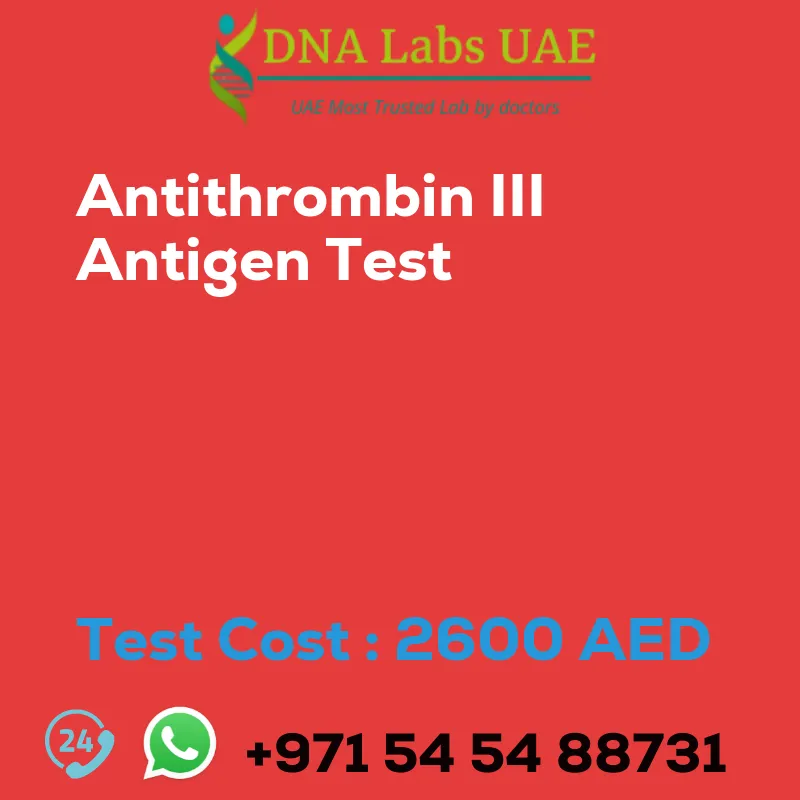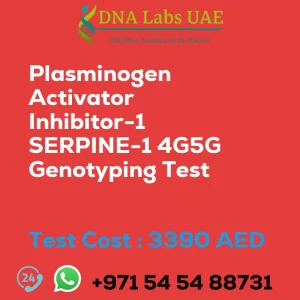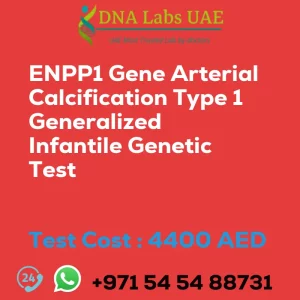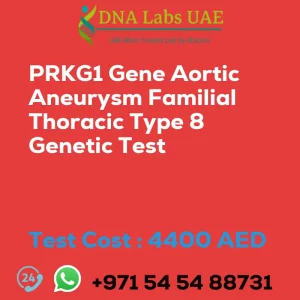ANTITHROMBIN III ANTIGEN Test
Components: Price 2600.0 AED
Sample Condition: 3 mL (1.5 mL min.) Platelet Poor Plasma (PPP) from 2 Blue Top (Sodium Citrate) tubes. Prepare PPP within 1 hour of collection as follows: Centrifuge sample at 3600 rpm for 15 min. & transfer supernatant to a clean plastic tube. Centrifuge this supernatant again at 3600 rpm for 15 mins. & finally transfer the supernatant (PPP) to 1 labelled, clean plastic screw capped vial. FREEZE IMMEDIATELY. Ship frozen. DO NOT THAW. Overnight fasting is preferred. Duly filled Coagulation Requisition Form (Form 15) & Test send Out Consent Form is mandatory. Patient should avoid Anabolic steroids, Gemfibrozil, Heparin therapy, Asparaginase, Estrogens, Gestodene and Oral contraceptives 3 days prior to specimen collection.
Report Delivery: Sample by 7th of the month; report after 2-3 weeks.
Method: Fixed Rate Time Nephelometry
Test type: Thromboembolic disorders
Doctor: Hematologist
Test Department: OS
Pre Test Information: Overnight fasting is preferred. Patient should avoid Anabolic steroids, Gemfibrozil, Heparin therapy, Asparaginase, Estrogens, Gestodene and Oral contraceptives 3 days prior to specimen collection. Duly filled Coagulation Requisition Form (Form 15) & Test send Out Consent Form is mandatory.
Test Details
The Antithrombin III Antigen test is a blood test that measures the levels of Antithrombin III (AT III) antigen in the blood. Antithrombin III is a protein that plays a crucial role in preventing blood clot formation. It inhibits the activity of several clotting factors, particularly thrombin and factor Xa.
This test is primarily used to diagnose and monitor conditions that affect the body’s ability to form blood clots, such as thrombosis or thromboembolism. It can also be used to assess the effectiveness of anticoagulant therapy or to investigate a potential deficiency of Antithrombin III.
During the test, a blood sample is taken from a vein in the arm and sent to a laboratory for analysis. The levels of Antithrombin III antigen in the blood are measured, and the results are compared to a reference range to determine if there is a deficiency or abnormality.
A low level of Antithrombin III antigen may indicate a deficiency, which can increase the risk of blood clot formation. This can be inherited or acquired due to certain medical conditions, medications, or liver disease. Conversely, a high level of Antithrombin III antigen may suggest an inflammatory condition or acute thrombosis.
It is important to note that the Antithrombin III Antigen test measures the amount of Antithrombin III protein in the blood, but it does not assess its activity. Additional tests, such as the Antithrombin III activity test, may be necessary to evaluate the functional capacity of Antithrombin III.
| Test Name | ANTITHROMBIN III ANTIGEN Test |
|---|---|
| Components | |
| Price | 2600.0 AED |
| Sample Condition | 3 mL (1.5 mL min.) Platelet Poor Plasma (PPP) from 2 Blue Top (Sodium Citrate) tubes. Prepare PPP within 1 hour of collection as follows:Centrifuge sample at 3600 rpm for 15 min. & transfer supernatant to a clean plastic tube. Centrifuge this supernatant again at 3600 rpm for 15 mins. & finally transfer the supernatant (PPP) to 1 labelled, clean plastic screw capped vial. FREEZE IMMEDIATELY. Ship frozen. DO NOT THAW. Overnight fasting is preferred. Duly filledCoagulation Requisition Form (Form 15) & Test send Out Consent Formis mandatory. Patient should avoid Anabolic steroids, Gemfibrozil, Heparin therapy, Asparaginase, Estrogens, Gestodene and Oral contraceptives 3 days prior to specimen collection. |
| Report Delivery | Sample by 7th of the month; report after 2??3 weeks. |
| Method | Fixed Rate Time Nephelometry |
| Test type | Thromboembolic disorders |
| Doctor | Hematologist |
| Test Department: | OS |
| Pre Test Information | Overnight fasting is preferred. Patient should avoid Anabolic steroids, Gemfibrozil, Heparin therapy, Asparaginase, Estrogens, Gestodene and Oral contraceptives 3 days prior to specimen collection. Duly filledCoagulation Requisition Form (Form 15) & Test send Out Consent Formis mandatory. |
| Test Details |
The Antithrombin III Antigen test is a blood test that measures the levels of Antithrombin III (AT III) antigen in the blood. Antithrombin III is a protein that plays a crucial role in preventing blood clot formation. It inhibits the activity of several clotting factors, particularly thrombin and factor Xa. This test is primarily used to diagnose and monitor conditions that affect the body’s ability to form blood clots, such as thrombosis or thromboembolism. It can also be used to assess the effectiveness of anticoagulant therapy or to investigate a potential deficiency of Antithrombin III. During the test, a blood sample is taken from a vein in the arm and sent to a laboratory for analysis. The levels of Antithrombin III antigen in the blood are measured, and the results are compared to a reference range to determine if there is a deficiency or abnormality. A low level of Antithrombin III antigen may indicate a deficiency, which can increase the risk of blood clot formation. This can be inherited or acquired due to certain medical conditions, medications, or liver disease. Conversely, a high level of Antithrombin III antigen may suggest an inflammatory condition or acute thrombosis. It is important to note that the Antithrombin III Antigen test measures the amount of Antithrombin III protein in the blood, but it does not assess its activity. Additional tests, such as the Antithrombin III activity test, may be necessary to evaluate the functional capacity of Antithrombin III. |








